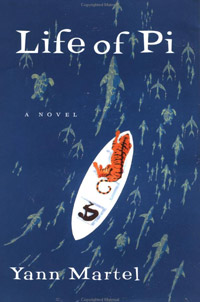By
Yann Martel
 “Very few castaways claim to have survived so
long at sea as Mr. Patel, and none in the company of an adult Bengal
tiger.” That amazingly preposterous statement is the premise of
Pi’s life and the last sentence of Life of Pi, a story
of survival at sea and the search for God. Yann Martel takes a new and
unbelievable setup – a young Indian boy shipwrecked in a lifeboat
with a tiger – and makes it simultaneously focused on the trivial
and transcendent. The increasingly personal story works as all great
novels should, exploring the human condition through universal feelings
and details. The most surprising and touching moments in the book, and
there are many, occur as we realize that Pi’s thoughts and actions
are strange, irrational, and shocking, but that ours might be the same
in that unfortunate situation.
“Very few castaways claim to have survived so
long at sea as Mr. Patel, and none in the company of an adult Bengal
tiger.” That amazingly preposterous statement is the premise of
Pi’s life and the last sentence of Life of Pi, a story
of survival at sea and the search for God. Yann Martel takes a new and
unbelievable setup – a young Indian boy shipwrecked in a lifeboat
with a tiger – and makes it simultaneously focused on the trivial
and transcendent. The increasingly personal story works as all great
novels should, exploring the human condition through universal feelings
and details. The most surprising and touching moments in the book, and
there are many, occur as we realize that Pi’s thoughts and actions
are strange, irrational, and shocking, but that ours might be the same
in that unfortunate situation.
The first 36 of the 100 short chapters dive into Pi’s life growing
up in India. Martel excels at evoking a rich, colorful world and cast
of characters, while creating a second realm of Pi’s spiritual
quest. Like many modern Indians (and in a manner evoking Gandhi’s
beliefs), Pi incorporates several disparate religious traditions into
his worldview. Conflict occurs when his Hindu, Muslim, and Christian
gurus argue with his parents over the boy’s religious future, but
subsides with the consistent idealistic reason of the boy himself.
It seems a ridiculous twist when, while moving with his family and his
father’s zoo animals to Canada, Pi and several of the animals end
up as the only survivors of a horrible disaster at sea. The rest of the
book dwells on Pi’s incredible strength in coping with solitude
and budding insanity, calling on his deep connection with the Divine
to sustain him through an unimaginable ordeal.
The best part of this book are the two fully realized characters of
Pi and Richard Parker … the tiger. I enjoyed the first third of
the book the most, and was a little surprised at the ending. Many moments
in the book are permanently memorable, such as Pi’s attempt to
rename himself, the description of his father’s zoo in Pondicherry,
the in-depth details of animal behavior, and Pi’s adventure on
an evil island made out of celery and meerkats. That last phrase should
alert you to the many strange and unexpected scenes in Life of Pi,
making Martel’s descriptive ability and incredible imagination
the real draws to this intriguing novel.
Read September 2002